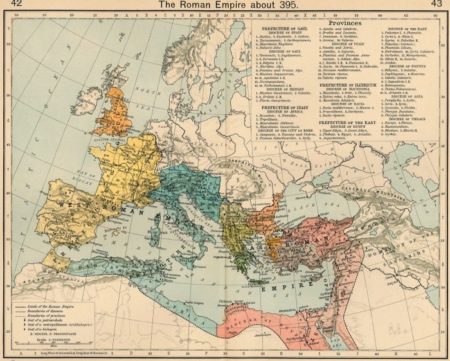I have been spending some time over the summer in Paul’s Letter to the Romans. The letter is a missionary tract in many ways. Paul asks the sisters and brothers in Rome to join him in mission to Spain. He is out to make more sisters and brothers on the Iberian Peninsula. And he invites the church in Rome to come along. (See, for example, 15:23,24.)
We may outline the entire book around this practical missionary purpose. Last month we introduced a first simple point. For the Apostle Paul, Spain matters – and beyond Spain, the entire lost world matters urgently. This month we add a second point to an emerging four-part outline. Rome matters, too.
It is useful to note (and often overlooked) that Paul never employs “saint” in the singular – not in the book of Romans, not anywhere in his letters. Wherever the New Testament saints appear, they appear in the plural – the collective “hagioi” of God. And so we find in Rome. Paul directs his letter to “all God’s beloved in Rome, who are called to be saints” (1:7). When Paul thinks of the “set apart” – the people of God on mission in the world – he characteristically thinks in the plural. Where Paul finds the saints of God, he finds his partners in mission.
And it matters.
In chapter ten, the Apostle reminds his readers that the gospel is for absolutely everyone. “For there is no distinction between Jew and Greek… ‘Everyone who calls on the name of the Lord shall be saved'” (vv.12,13). Yet the calling and the saving do not happen automatically. The lost cannot call on the Lord if they have not first believed in him; they cannot believe if they have not sometime heard of him; they will not hear without someone to proclaim him. And “how are they to proclaim him unless they are sent?” (vv.14,15). Paul expects his readers to know the answer to his obvious rhetorical query. And he expects that the answer will lead them to Spain.
Hudson Taylor once complained about a lovely old missionary hymn, loved by many, yet inadequate in Taylor’s estimation. The hymn begins with “Greenland’s icy mountains.” The final verse, in particular, perturbed Hudson Taylor: “Waft, waft, ye winds his story,” the hymn pleads. “But the winds will not waft it,” Taylor complained. “Some of you must go and tell it!”
So the church in Rome – the world church – has an important role to play. Indeed, its role today is more strategic than ever.
A few weeks ago, the New York Times’ Sunday Magazine featured a Nigerian missionary on its cover – under the banner, “The Most Profound Change in American Christianity…” (April 12, 2009). The Nigerian brother, it turns out, is a missionary to the United States.
The magazine describes “a revolution in worldwide Christianity, one that it is quite literally changing its face, as a faith that was once exported by… missionaries from Europe and America comes to draw its strength from the peoples of the Southern Hemisphere.” “Things are not the way they used to be,” reports the Nigerian brother. “All kinds of things: pollution and watering down of the Gospel – the gospel of convenience, the gospel of tolerance. You [Americans] want to please people rather than pleasing God. That is one of the purposes why we are here, to bring sanity to the church.”
Paul needed the world church – the sisters and brothers in Rome – if his mission to the lost on the Iberian Peninsula was to succeed. Contemporary western Christianity needs the world church, too. We need the sisters and brothers in Nigeria, and Ecuador, and China, and India, etc. We need their partnership in mission if we are to remain “sane” in its exercise, to borrow language from the brother introduced in the New York Times. Our Nigerian brothers will remind us, let me tell you, that the mission of God is about the gospel of Jesus Christ. It is about proclaiming him, lest we ever forget – so that the world may hear, and may come to believe, and the lost may be found and call upon the Lord for salvation (Romans 10).
Rome matters — and for the western Christian world today, so does Nigeria. The mission of God, you see, appears in the plural. It is only lately that we have forgotten; it is time to remember today.
[Next month: Jerusalem matters!]
Other posts in this Mission Matters series:
